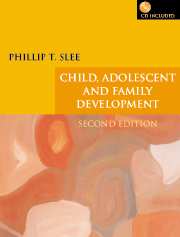Book contents
- Frontmatter
- Contents
- List of Trends and issues
- List of Family life-cycles
- List of Figures and Tables
- Note to the Student
- Note to the Instructor
- How to use the CD-ROM
- Acknowledgements
- Introduction
- Part 1 The Study of Human Development
- Part 2 Conception and Birth
- Part 3 Infancy
- Part 4 Toddlerhood
- Part 5 The Pre-school Years
- Part 6 Middle Childhood
- Part 7 Adolescence
- 18 Adolescent Physical Development and Health Issues
- 19 Cognitive Development in Adolescence
- 20 Social and Emotional Development in Adolescence
- Part 8 Studying Human Development
- Glossary
- References
- Index
- STUDENT FEEDBACK FORM
19 - Cognitive Development in Adolescence
from Part 7 - Adolescence
- Frontmatter
- Contents
- List of Trends and issues
- List of Family life-cycles
- List of Figures and Tables
- Note to the Student
- Note to the Instructor
- How to use the CD-ROM
- Acknowledgements
- Introduction
- Part 1 The Study of Human Development
- Part 2 Conception and Birth
- Part 3 Infancy
- Part 4 Toddlerhood
- Part 5 The Pre-school Years
- Part 6 Middle Childhood
- Part 7 Adolescence
- 18 Adolescent Physical Development and Health Issues
- 19 Cognitive Development in Adolescence
- 20 Social and Emotional Development in Adolescence
- Part 8 Studying Human Development
- Glossary
- References
- Index
- STUDENT FEEDBACK FORM
Summary
‘Alone’
From childhood's hour I have not been
As others were – I have not seen
As others saw – I could not bring
My passions from a common spring –
From the same source I have not taken
My sorrow I could not waken
My heart to joy at the same tone –
And all I loved – I loved alone …
Edgar Allen Poe (1829) from Childhood's HourKEY TERMS AND CONCEPTS
Formal operations
‘La méthode clinique’
Information processing
Developmental tasks
Cycle of learning
Imaginary audience
Personal fable
Introduction
The nature of adolescent thinking has been the subject of a good deal of research. During adolescence individuals acquire a greater flexibility in the way they think and their cognitive abilities come to more closely resemble those of an adult. Adolescents are able to think in abstract terms and consider at length the nature of complex concepts such as beauty, truth and justice. This skill is promoted by their ability to entertain different ideas at the same time and to hypothesise about possibilities. In adolescence, individuals develop further their ability to put themselves in the place of another and then to consider such questions as ‘What would it be like to be a person from a different cultural background?’
In this chapter we examine the way adolescents' thinking develops, particularly the transition from the concrete operational way of thinking that prevails in middle childhood to the formal operational thought of adolescence. The new skills acquired with formal operational thought are identified and discussed.
- Type
- Chapter
- Information
- Child, Adolescent and Family Development , pp. 413 - 430Publisher: Cambridge University PressPrint publication year: 2002



